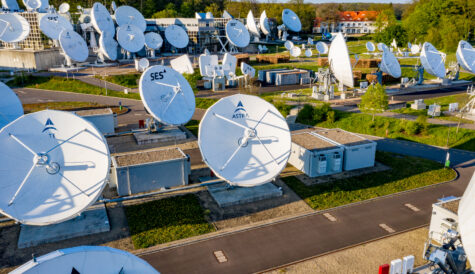Eutelsat Group’s LEO satellite constellation connects to 5G

Source: Eutelsat
Satellite communications company, Eutelsat Group, the Eutelsat and OneWeb joint venture, has announced its low Earth orbit (LEO) satellite constellation has successfully connected to a 5G mobile network.
The satellite operator said the project is attributed to the Sunrise Programme, a partnership supported by the European Space Agency. The initiative aims to unite the industry around large-scale programmes, fostering significant advancements and driving economic growth. Through the demonstration, the University of Surrey tested a 5G mobile network by connecting Surrey’s 5G core to a cell site through the LEO constellation, which consists of over 600 satellites in orbit and is the second-largest constellation globally.
Over the constellation-assisted connection, researchers tested video conferencing calls, video streaming, gaming, virtual and augmented reality content, and simple web browsing. With a LEO constellation, the service can deliver low-latency connectivity coupled with high speeds to enable these applications, according to Eutelsat Group.
The company explained the tests highlighted a seamless, smooth handover between the LEO network and terrestrial networks, delivering a smooth 5G connectivity experience to users.
Barry Evans, Professor of Satellite Communications at the 6G/5G Innovation Centre (6G/5GIC) at the University of Surrey, said: “This is a step closer to increasing internet access for more people around the world – a privilege that many of us take for granted. The work performed in the 5G pilot tests has demonstrated the feasibility of 5G backhaul over LEO satellites.”
Eutelsat OneWeb’s connectivity works by using a system similar to 4G. Surrey researchers matched 5G quality levels in the mobile network with 4G quality levels in the LEO network. This enabled end-to-end support for all the applications trialed in the project. The group recently signed a deal with Telstra in Australia to backhaul their 4G and 5G networks.
Massimiliano Ladovaz, Eutelsat Group Chief Operations Officer, added: “We are delighted to have collaborated with the University of Surrey and ESA on these 5G pilot tests, which underscored the huge potential of our LEO services for serving mobile users in rural and remote areas. As we continue to deliver for our existing customers and look forward to activating global coverage later this year, our driving focus will continue to revolve around expanding access to connectivity around the world.”



